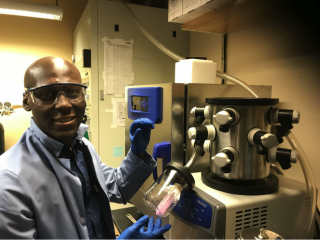A Diagnosis That Led to Life’s Mission: Working to Reverse Alopecia Areata at Columbia

Most Amgen Scholars only begin to learn about their summer research topic in their college years. For Trévon C. Gordon, his research topic began in high school, when he began to suffer from a condition called alopecia areata, which prevents him from growing hair. Since then, understanding the autoimmune disease has become his mission, and he spent his Amgen Scholars summer researching ways to treat it with a cutting-edge researcher who herself has alopecia areata.
“Whenever asked about my alopecia I always try to show distinction between what I have – alopecia areata – and male-pattern baldness – androgenic alopecia – by saying I have an autoimmune disease,” Gordon explains. “Usually the follow-up question is something along the lines of “is that genetic?” or “will you have this for your entire life?”, to which I try to explain how the disease is caused by an immune attack on the hair follicle and that the hair can regrow at any time once the autoimmune response has ended.”
Gordon first learned about the disease in high school when he began losing his hair and calls it “an eye-opening experience.” Life got exponentially harder for him and his mom. “It was a mix of terrible emotions and poor circumstances that almost tore our little family apart,” he says. But with his mom providing vital support and guidance, he began college at Wesleyan University. Spurred by his diagnosis, he began becoming an expert on alopecia areata.
Gordon’s research started with medical websites and then advanced to PubMed research articles. When he read a paper by Angela Christiano and colleagues at Columbia about reversing alopecia areata by inhibiting the Janus kinase (JAK) family of enzymes, known as JAK inhibitors, he dug deeper into her group’s work. He had just made the decision to transfer from Wesleyan to Columbia. “Once I found out that Dr. Christiano was affiliated with Columbia, I made it my mission to work for her the following summer before I started at Columbia,” Gordon says.
Dr. Christiano’s team made headlines in 2016 with its clinical trial showing that 75 percent of patients with moderate to severe alopecia areata who were treated with a JAK inhibitor had significant hair regrowth. Dr. Christiano herself has the disease and now boasts a full head of hair.
Gordon’s summer research as part of the Amgen Scholars Program focused on showing that nanoparticles could be used to selectively deliver JAK inhibitors to hair follicles, to improve previous topical JAK inhibitor formulations. Most of the summer, he says, was spent characterizing the behavior of the nanoparticles using a fluorescent dye. The results were promising, showing exactly what they hoped in terms of the nanoparticles penetrating into the hair follicles of mice.
“Working under Angela has been a remarkable experience. My entire perspective about alopecia areata has been shaped by working with her and the people in her lab,” Gordon says. The key thing he learned from working in her lab was precision and attention to detail.
“I truly believe the nanotechnology we are working on can be utilized to improve treatments or create new treatments for hair loss,” he says. “My current plan is to continue to do this research either here at Columbia or at my own nanotechnology startup.”
Gordon’s Amgen Scholars experience has opened his eyes to all of the areas of study that have relevance to advancements in treating alopecia areata. “In our cohort, there was a lot of interesting work is being done in cell signaling and in stem cell quiescence, both areas that are important for hair follicle cycling and hair growth,” he explains. The U.S. symposium was also important in showing him a broad range of biotechnology tools, technologies, and research.
He credits his journey to date on his mother: “There really is no story without my mom, and the older I get, the more I can appreciate how awesome of a person I have in my corner."
To learn more about the Amgen Scholars Program, please visit AmgenScholars.com and check out the #AmgenScholars hashtag on Twitter. Follow @AmgenFoundation to stay up to date with all STEM-related news from the Amgen Foundation.

